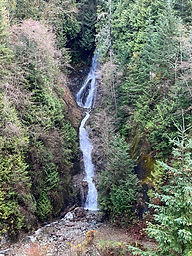Settler Education 101: Indigenous Learning Opportunities
- kc dyer
- Feb 4, 2023
- 2 min read
Updated: Jul 1, 2023
Nuuw!
Welcome to the second edition of Settler Ed 101. Please have a peek HERE if you missed the first edition. In that post, I left you with the homework of learning how to pronounce the Squamish word for our village: Ch'ích'íyuy Elxwíkn. Here's my phonetic shot at it:
Chee-chee-oy El-whay-kn
I've been saying it out loud whenever I pass the sign on the highway, just to cement it into my memory. If you'd like to learn how to pronounce more Squamish place names from along the Sea to Sky, you can have a look HERE at the Squamish Language YouTube channel. It's loaded with great pronunciation hints for place names, and greetings and so much more.
This is where I learned today's greeting - Nuuw - which is pronounced like a long 'Noooo', and means 'hello' in Squamish.
Today, I'd like to highlight an amazing opportunity for those who are ready to begin a journey into the history of Indigenous Peoples in Canada, told from an Indigenous perspective. The Department of Indigenous Studies at the University of Alberta offers a number of Continuing Education classes for online learning, but if you're new to these studies, there's one that really stands out.
Indigenous Canada is a Massive Open Online Course (MOOC) offered over 21 hours of self-directed study, and it's FREE. You can pay $65 to receive a Coursera Certificate, but that's not necessary to complete the course.
I took this course last year and loved every minute of it. That said, I spent a lot of time shocked, angered and infuriated by how lacking my conventional education has been. But this course has empowered me to want to know more, and I cannot recommend it highly enough. The course is aimed at beginners and is delivered through a combination of video lectures, readings and explorations of Indigenous Art. There are twelve modules, each taught by an Indigenous instructor or presenter and every one is a punch in the gut to everything you thought you knew about Canadian history. You can progress at your own pace, but to stay on track to finish in twelve weeks, you should set aside two to three hours a week to cover the material.
I know that the teaching of Canadian history has evolved since I was a learner and a teacher myself, but I still feel like every Canadian owes it to themselves to take a peek at what life really was like for our Indigenous brothers and sisters trying to survive in a nation whose very structure was designed to wipe them out.
If you've taken this course already, or others like it, I'd love to hear your thoughts! You can comment below, or write to editor@lionsbaywatershed.ca



Good idea!